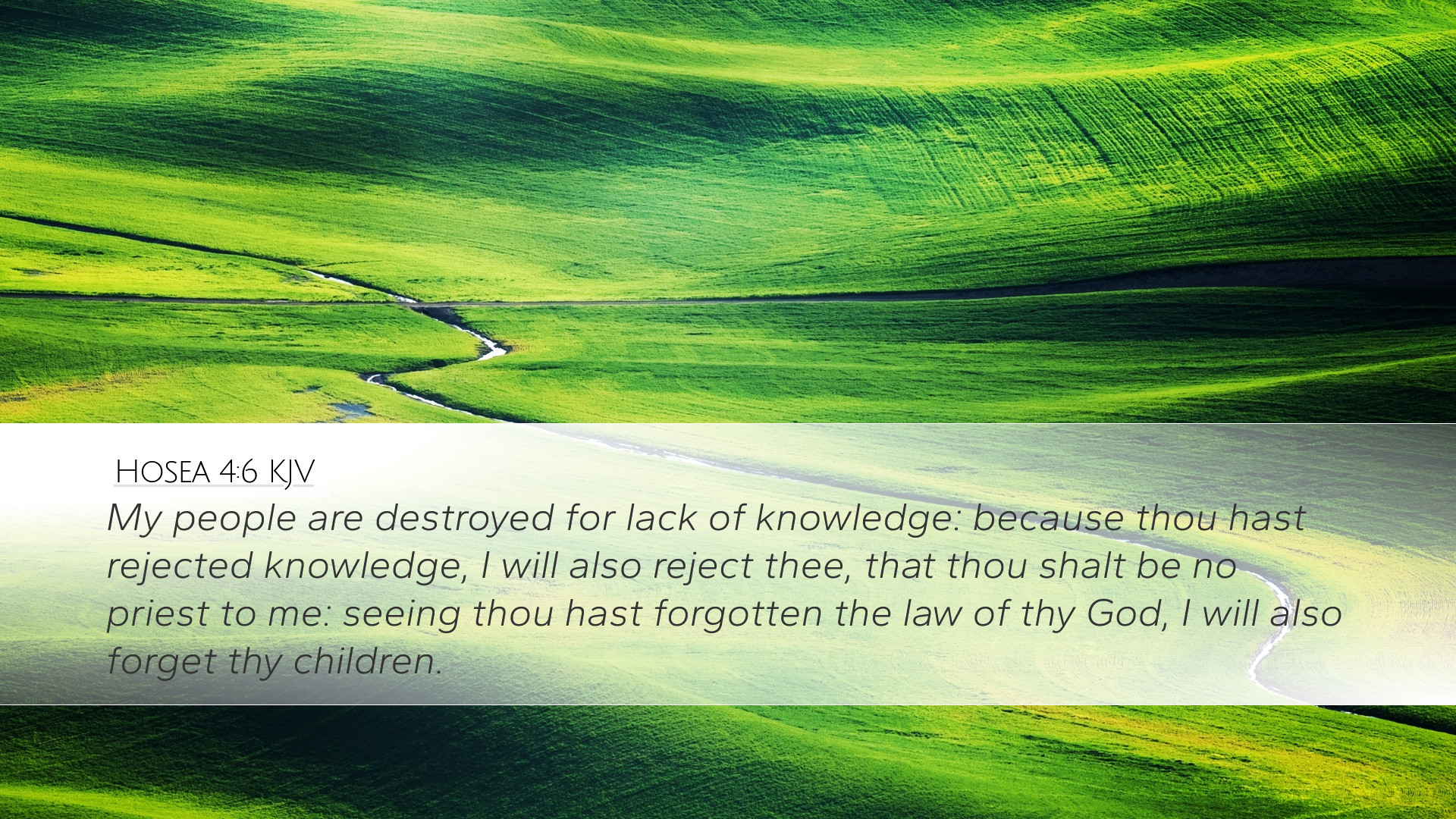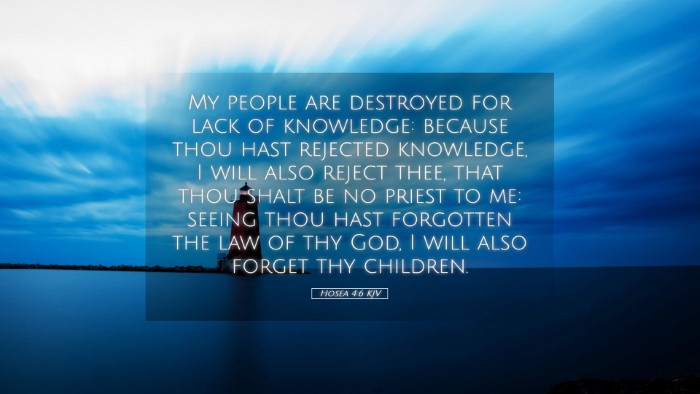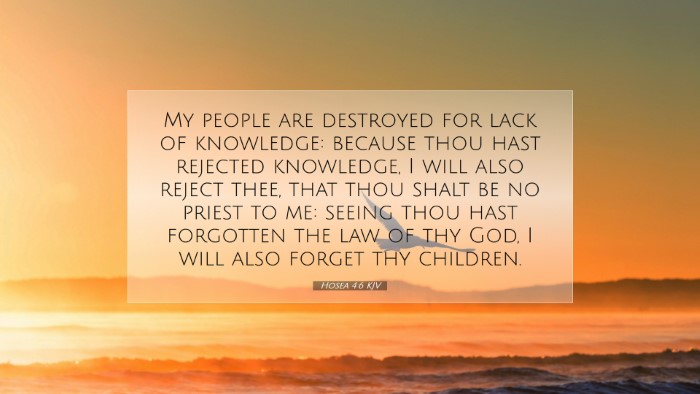Old Testament
Genesis Exodus Leviticus Numbers Deuteronomy Joshua Judges Ruth 1 Samuel 2 Samuel 1 Kings 2 Kings 1 Chronicles 2 Chronicles Ezra Nehemiah Esther Job Psalms Proverbs Ecclesiastes Song of Solomon Isaiah Jeremiah Lamentations Ezekiel Daniel Hosea Joel Amos Obadiah Jonah Micah Nahum Habakkuk Zephaniah Haggai Zechariah MalachiHosea 4:6
Hosea 4:6 KJV
My people are destroyed for lack of knowledge: because thou hast rejected knowledge, I will also reject thee, that thou shalt be no priest to me: seeing thou hast forgotten the law of thy God, I will also forget thy children.
Hosea 4:6 Bible Commentary
Bible Commentary on Hosea 4:6
Verse: "My people are destroyed for lack of knowledge: because thou hast rejected knowledge, I will also reject thee, that thou shalt be no priest to me: and seeing thou hast forgotten the law of thy God, I will also forget thy children." (Hosea 4:6)
Introduction
Hosea 4:6 is a poignant declaration of the consequences of ignorance and the rejection of divine knowledge. This verse encapsulates the essence of Israel's plight during the time of the prophet Hosea and serves as a profound warning to contemporary believers concerning the importance of knowledge in relation to faith and obedience.
Analysis of the Text
The text divides into components that highlight the sin of ignorance, the rejection of knowledge, and the dire consequences that follow such rejection. Each aspect merits deeper exploration.
Lack of Knowledge
Matthew Henry: Matthew Henry emphasizes that knowledge is fundamental for understanding the will of God. Without it, believers are susceptible to errors and sins that lead to destruction. Hosea identifies the root cause of Israel's moral and spiritual decline: a profound lack of knowledge regarding God’s law and character.
Albert Barnes: Albert Barnes notes that knowledge pertains not only to intellectual understanding but also to practical application. Knowledge of God should influence conduct and lifestyle. Barnes articulates that the people's ignorance leads to their downfall, as they fail to recognize the seriousness of their actions before God.
Rejection of Knowledge
Adam Clarke: Adam Clarke points out that the rejection of knowledge signifies a conscious choice to turn away from understanding God's commandments. This willful ignorance distances one from God's favor and results in judgment. Clarke warns that rejecting divine instruction can render one unfit for service in the priesthood, implying a loss of spiritual authority and effectiveness.
Matthew Henry: He further elaborates on the dangers of rejecting God’s knowledge. He argues that when a people or individual disregards the truth, they not only jeopardize their relationship with God but invite divine discipline. This rejection creates a barrier between God and His people, exemplifying that spiritual neglect leads to spiritual consequences.
Consequences of Forgetting God’s Law
The phrase “I will also forget thy children” signifies not only a loss of spiritual connection but also generational consequences. The neglect of God leads to disastrous ramifications for future generations.
Albert Barnes: Barnes asserts that the forgetting of God’s law indicates a severe deterioration in moral and ethical standards. The community’s collective amnesia towards God’s mandates exacerbates their sinful behavior, ultimately leading to societal decay.
Adam Clarke: Clarke focuses on the family aspect of judgment. He interprets the children as symbols of future generations who will suffer the consequences of their parents’ spiritual negligence. The warning reflects a communal responsibility towards teaching and upholding God’s laws.
Theological Implications
This verse challenges ministers, scholars, and theologians to reflect deeply on the implications of knowledge within the community of faith. Recognizing God’s law, understanding it, and applying it are crucial components of a faithful life.
Knowledge as a Source of Spiritual Vitality
Understanding and pursuing knowledge in Scripture is paramount for spiritual growth. Hosea 4:6 underscores the notion that ignorance does not lead to neutrality; rather, it leads to destruction. The role of theological education becomes imperative for today’s pastors and church leaders.
Matthew Henry: He encourages believers to actively seek God’s Word, asserting that true wisdom comes from God alone. Engaging with Scripture fosters a deeper relationship with the Almighty and equips believers to discern good from evil.
Importance of Teaching
Hosea’s critique is also a reminder of the significance of effective teaching within the church. Pastors bear the responsibility of imparting knowledge to their congregations, ensuring that they are not led astray by false beliefs or practices.
Albert Barnes: He calls upon church leaders to prioritize teaching the congregants about God’s commands and character. The failure to do so often results in a community that is disconnected from God’s heart.
Conclusion
Hosea 4:6 is an urgent reminder of the critical need for knowledge in the life of faith. The dangers of rejecting this knowledge are laid bare, highlighting that ignorance can lead to destruction, both individually and collectively. Pastors, scholars, and students of the Word are encouraged to uphold and disseminate the truths of Scripture, fostering a deeper understanding of God’s will. In doing so, they create a foundation of faith that benefits not only the present generation but also countless generations to come.


